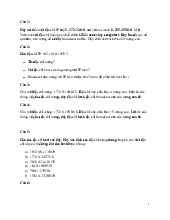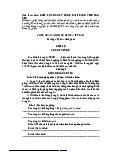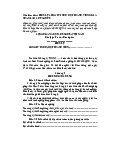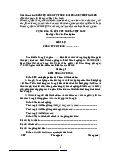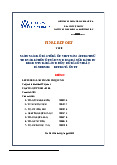




Preview text:
Section 3 Question:
A response to an irregularity notice must be received by WIPO by the date indicated on the
notice. The timeframe in which to respond will be either three months or two months,
depending on the issues raised in the irregularity.
If the issues raised in the irregularity notice are not remedied by the due date what could the
outcomes be for the application? Answer: Three month timeframe:
The standard time limit to remedy the irregularities is three months from the date when the
irregularity notice was notified by WIPO. If the issues raised in the notice are not remedied by
the due date, the delay may lead to the application being abandoned. Two month timeframe:
If the MM18 form (a declaration of intention to use the mark) required by the United States of
America is missing from the international application or does not comply with the applicable
requirements, the applicant has two months from the date of receipt of the international
application by the Office of origin to remedy the irregularity.
If the missing or corrected MM18 form is not received within the prescribed period, the
international application will be processed for registration without designation of the United
States of America. WIPO will reimburse any fee paid in connection with the designation of that Contracting Party. Question:
Where a response to an irregularity from an Office disagrees with WIPO’s proposal concerning
the classification of goods and services under Rule 12, what may WIPO do upon further consideration? Answer:
Upon further consideration WIPO may:
Withdraw Its Initial Proposal - If the response received from the Office of origin contains
further explanation or information to show that the goods and services raised in the
irregularity notice under Rule 12 belong in the class within which they were originally
classified, and WIPO accepts that this is correct.
Modify Its Initial Proposal - If the response received from the Office of origin provides
further clarity to the nature of the goods and services, but it is still not enough for WIPO
to accept that this is correct.
Confirm Its Initial Proposal - If the response from the Office of origin contains a proposed
amendment or further information to show that the goods and/or services raised in the
irregularity notice under Rule 12 belong in the class within which they were originally
classified, but WIPO disagrees with the Office of origin. Scenario Answers Irregularities (1)
Yes, the response from the Office of origin is sufficient for the application to meet WIPO’s
requirements and for the application to be granted registration.
The only issue raised in the irregularity notice was under Rule 12.
The international application already contains class 16. Consequently, the grouping of goods
suggested by WIPO does not add an additional class, which would require additional fees.
As the correspondence from the Office of origin confirms the goods raised in the irregularity
notice should be moved, the international application’s list of goods and services are now
correctly classified according to WIPO. This means that the application can be registered in the International Register. Irregularities (2) Question 1:
No, a priority date cannot be claimed for all the basic marks listed in the international application.
If an applicant wishes to claim priority of an earlier filing, the earlier filing cannot be more than
six months earlier than the date of the international registration.
In this instance some of the priority dates are older than six months. Question 2:
Priority can be claimed from basic marks 18038565 and 18620495. Question 3:
No, the response to the irregularity notice does not have to come from the Office of origin,
rather it should come from the applicant.
The missing information can be furnished directly to the International Bureau by the applicant.
This is listed in the irregularity notice in the heading:
IRREGULARITY(IES) TO BE REMEDIED BY THE APPLICANT Question 4:
The priority date of each mark should clearly be linked to the goods and/or services to which it relates:
basic application number 18038565 – All the goods claimed in class 16,
basic application number 18620495 – All the goods and services claimed in classes 25 and 35. Irregularities (3) Question 1:
The Office of origin or the applicant can respond to WIPO to remedy this issue. This is stated in the irregualrity notice:
In order to maintain the designation of the United States of America in the international
application, a new complete declaration of intention to use the mark, on form MM18,
complying with all the necessary requirements, should be sent to the International
Bureau by the applicant, or by the Office of origin. Question 2:
The designation of the United States of America will be removed from the application. The
application will then be recorded in the International Register without this designation. Question 3:
Yes, the applicant may still use the Madrid System to get protection for the United States of America.
Once the application has been registered by WIPO and an international registration number has
been allocated, the holder may subsequently designate the United States of America, provided
that the subsequent designation includes a completed MM18 form. Irregularities (4) Question 1:
The applicant should communicate to the Office of origin their agreement to reword the goods
in class 16 and also their agreement to reword the goods in class 9 and transfer them to class 28
as proposed by WIPO. The Office of origin will then communicate the applicant’s agreement to WIPO. Question 2:
If the applicant does not agree with the suggested wording proposed by WIPO, they can
propose an alternative re-wording of the terms raised in the irregularity notice. The applicant
must communicate this alternative re-wording to the Office of origin, which will forward it to WIPO. Question 3:
If satisfied with the alternative suggestions communicated by the Office of origin, WIPO will
change the terms accordingly and proceed the international application to registration.
However, if no proposal acceptable by WIPO is made within the time limit indicated in the
irregularity notice, the application will proceed to registration with the terms as they appear in
the international application, bearing the indication Terms considered too vague by the
International Bureau - Rule 13.2.b of the Common Regulations. Question 4:
If the Office of origin does not respond to the irregularity notice, the application will proceed to
registration with the terms as they appear in the international application, bearing the
indication Terms considered too vague by the International Bureau - Rule 13.2.b of the Common Regulations. Irregularities (5) Question 1:
The Office of origin can inform the holder that an irregularity notice had been issued by WIPO,
wherein a number of terms were considered as either too vague, linguistically incorrect, or
incomprehensible. A copy of this notice was forwarded from WIPO to the Office of origin and
the address for correspondence recorded in the international application.
The Office of origin tried to contact the applicant to seek their views concerning the irregularity
notice, but did not reach them either by mail or by phone.
As no response was received by the due date recorded in the irregularity notice, WIPO included
in their international registration indications that, in their opinion, these specified terms are
either too vague, linguistically incorrect, or incomprehensible. Question 2:
No. The holder cannot submit a request for continued processing with regard to the irregularities under Rule 13.
This type of irregularities has to be remedied by the Office of origin within the time limit
indicated in the irregularity notice.
If the Office of origin does not respond to the irregularity notice, the application will proceed to
registration with the terms as they appear in the international application. The international
registration will contain an indication that, at WIPO’s opinion, the specified terms are too vague,
linguistically incorrect, or incomprehensible.
Where an international registration is recorded with WIPO’s opinion concerning the indication
of goods and services, there is a risk that the designated Contracting Parties may issue a
provisional refusal. The holder will need to communicate with each Office directly to overcome the provisional refusal. Question 3:
An applicant may request continued processing concerning the irregularities referred to in Rules
11(2) and (3) of the Common Regulations.
The request for continued processing has to be sent to WIPO on the official MM20 form and
must be signed by the applicant or their representative.
A fee of 200 Swiss francs applies to this request.
